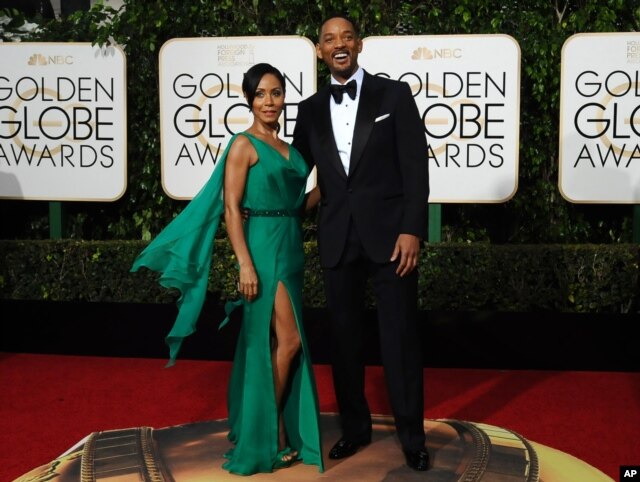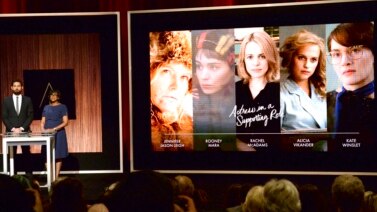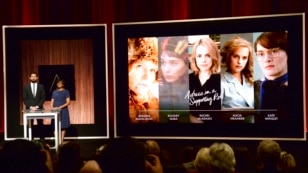
The Academy Awards ceremony is Hollywood’s biggest night of the year for actors and filmmakers. But this year, some are refusing to attend the ceremony. They are calling for a boycott.
They are boycotting the event because of the lack of diversity among the nominees for Academy Awards, also known as the Oscars.
All 20 people nominated for acting awards this year are white. Last year, all of the acting nominees were white, as well.
Actor Jada Pinkett Smith is leading the Oscars boycott. She asked that others join her as a way to express outrage that no African-American actors were nominated for an Academy Award.
Director Spike Lee has also said he and his wife would not attend the Oscars. He complained on social media about “another all white ballot.”
Don Cheadle, who won a best actor Oscar in 2004 for the film Hotel Rwanda, tweeted a joke about only being allowed to park cars at the Oscars.
@chrisrock Yo, Chris. Come check me out at #TheOscars this year. They got me parking cars on G level.
— Don Cheadle (@DonCheadle) January 17, 2016
Chris Rock is hosting the Academy Awards ceremony on February 28th. An African-American actor himself, Rock has been pressured by black entertainers to step down from the hosting job.
Lack of diversity for the second straight year
This marks the second straight year that people have voiced concern about the lack of diversity among Oscar nominees.
The nominees are chosen by the Academy of Motion Picture Arts and Sciences. The president of the Academy, Cheryl Boone Isaacs, is African-American. She released a statement this week addressing the lack of diversity.
Isaacs expressed her “heartbreak” and “frustration” over the lack of African-Americans and other minorities among this year’s acting nominees.
She said in the statement that this lack of diversity is “a difficult but important conversation and it is time for big changes.”
Pinkett-Smith posted a message on social media about the Isaacs’ statement. She tweeted: 'I would like to express my gratitude to the Academy, specifically Cheryl Boone Isaacs, for such a quick response in regard to the issue at hand. I look forward to the future.”
I would like to express my gratitude to the Academy, specifically Cheryl Boone Isaacs, (pt 1)
— Jada Pinkett Smith (@jadapsmith) January 20, 2016
for such a quick response in regard to the issue at hand. I look forward to the future. (pt 2)
— Jada Pinkett Smith (@jadapsmith) January 20, 2016
Pinkett-Smith has received support in her Oscar boycott from her husband, actor Will Smith. Smith told ABC News he would not attend the Academy Awards. Will Smith did not get nominated this year for his work in the movie Concussion.

But one African-American actor, Janet Hubert, does not support Pinkett-Smith’s Oscar boycott. Hubert starred with Will Smith in the 1990s television show The Fresh Prince of Bel-Air.
Hubert criticized Pinkett-Smith in a four-minute video. She said: “I find it ironic that somebody who has made...millions and millions of dollars from the very people you’re talking about boycotting, just because you didn’t get a nomination."
Hubert's video has been viewed over 2.5 million times on YouTube.
Pinkett-Smith responded to the criticism. She said in a video shared by Entertainment Tonight that “this whole Oscar controversy isn’t really about the Oscars.” She continued by saying that “right now, specifically with African-American people, we have some very serious issues that I think we as a people have to move together on.”
Lack of diversity in the Academy
Some say the diversity issue in Hollywood begins with the Academy itself.
The Los Angeles Times sampled more than 5,000 of the Academy’s 5,765 members in 2012. Ninety-four percent of the members of the Academy were white.
One Academy member is two-time Oscar winner Russell Williams II. He earned two Oscars in Sound Mixing. Williams is African-American and a voting member of the Academy. In other words, he plays a role in selecting Oscar nominees.
He said the makeup of the Academy itself should better represent the U.S. population. But he said it would not be easy to diversify the Academy. Members are elected for life. All Academy members have to be either Oscar nominees or winners themselves, or have extensive experience in a movie field.
Long history of lack of diversity
The 2015 and 2016 Oscars are far from the only years to suffer from a lack of diversity in acting categories. Throughout the Oscars’ 92-year-history, 95 percent of Oscar nominees have been white.
Since 2000, 10 percent of Oscar nominations have gone to black actors. Blacks represent 12.6 percent of the American population, says a report on race and film in The Economist.
But the lack of diversity in Hollywood concerns all minorities. Since 2000, just 3 percent of nominations have gone to Hispanic actors. The Hispanic population is 16 percent of the U.S. population. And only 1 percent of acting nominations have gone to actors with Asian backgrounds.
Gil Robertson is the President of the African American Film Critics Association. He told Reuters that he believes the diversity issue begins in the film studio system.
He said, "It's a definite problem. You can walk across the campuses of all the studios and never really see anyone of color and it's something that the industry needs to correct.”
Robertson pointed to the new “Star Wars” movie as a sign of Hollywood making those corrections. He noted that the three leads are a white actor, a black actor, and an Hispanic actor.
He said "There's something a little mechanical when you set about it like that, but at least they're heading in the right direction, and other films must follow, and will, if they want to capture those audiences."
I'm Ashley Thompson.
Ashley Thompson wrote this story for VOA Learning English, with reports from Reuters, TIME, The Economist and VOANews.com. Hai Do was the editor.
Words in This Story
diversity - n. the state of having people who are different races or who have different cultures in a group or organization
outrage - n. extreme anger
host - v. to entertain guests and audiences during an awards show
entertainer - n. a professional performer
address - v. to give attention to (something)
heartbreak - n. a very strong feeling of sadness or disappointment
conversation - n. the act of talking in an informal way
regard - n. care or concern for someone or something — often + foror to
ironic - adj. using words that mean the opposite of what you really think especially in order to be funny
sample - v. to test, study, or question (a group of people or things taken from a larger group) to get information
mechanical - adj. done without thought or without any effort to be different or interesting

